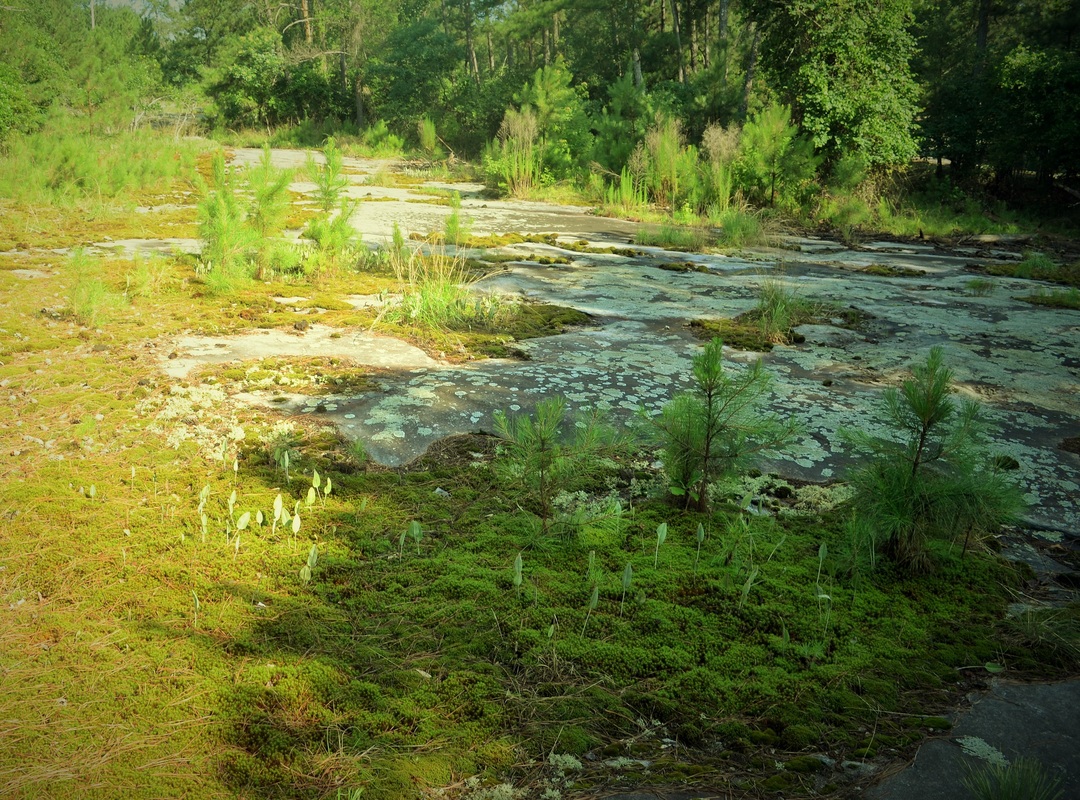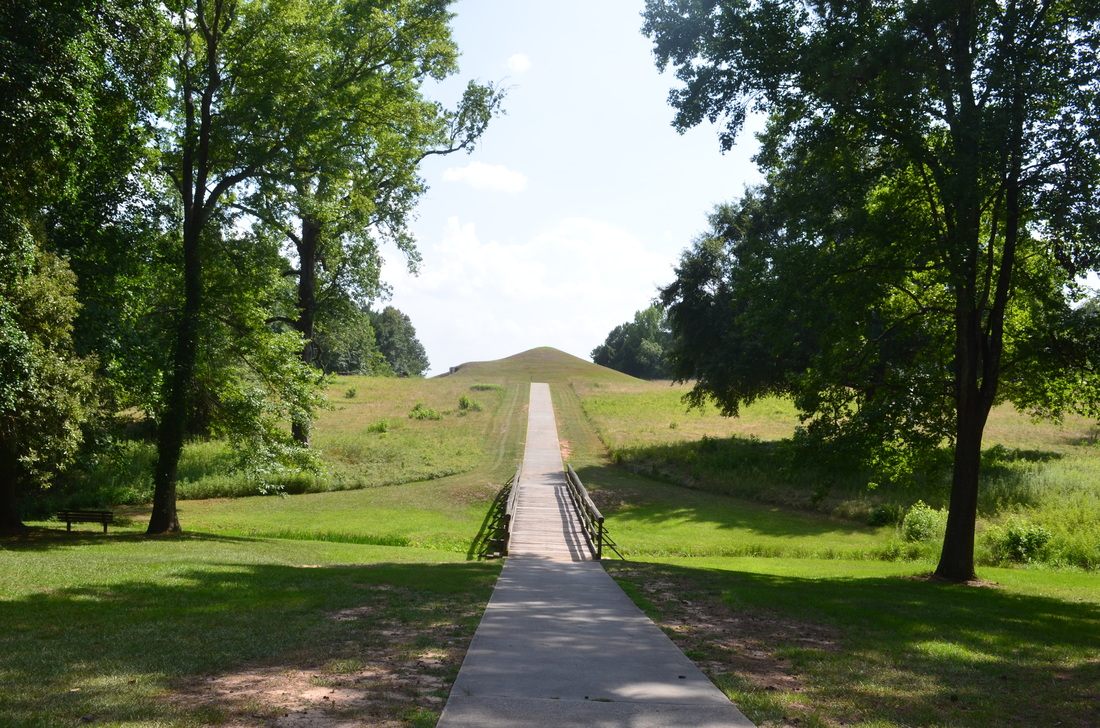Yesterday, I found my way to the top of Stone Mountain in Atlanta, Georgia, the region one of my favorite fantasy writers, Tom Deitz used in writing his stories. It was not unknown for one of his stories to start with a radio tarot reading, a song played that captured the hero David Sullivan's attention, (for me that would be Sheri Baby), then follow a list of songs that would cue him into trouble coming down via fairy land trauma. Somewhere along the tale, David Sullivan would grab a sleeping bag, head to the woods, or watch the sunrise atop Stone Mountain and chase after white stags or to find himself in a situation where all sorts of magical happenings would occur.
Is Stone Mountain magical?
Is Stone Mountain magical?
We arrived at the base of Stone Mountain early enough to realize that commercialization, sky ride, train, shows, and "rides" and the repotted plantation buildings had taken place and many that we later enjoyed, but not so much to keep us from observing the unique ecology of the region.
Rather than try to walk to the top in the heat, we wandered the parking lot, looking for a creek and I managed to find these cute little leaf plants that go right along with the image of a fairy world. Instead of a chasing a white stag, I merely woke up a deer who hustled further into the forest. We did find out there were mysterious fairy shrimp that arrived and were replaced by another species more clam like when we finally got up top.
So yes, if one has enough imagination, yes, there is magic and fantasy.
Rather than try to walk to the top in the heat, we wandered the parking lot, looking for a creek and I managed to find these cute little leaf plants that go right along with the image of a fairy world. Instead of a chasing a white stag, I merely woke up a deer who hustled further into the forest. We did find out there were mysterious fairy shrimp that arrived and were replaced by another species more clam like when we finally got up top.
So yes, if one has enough imagination, yes, there is magic and fantasy.
Tom Deitz' fantasy used the facts of native American society woven together with Celtic legendary. He like to dress up in the fashion that members of the Society for Creative Anachronism do, and he shared the common societal desire to escape the modern office into somewhere else. In the hands of a fantasy writer, Ocmulgee National Monument Earth Lodge becomes a somewhere else where monsters are fought by Indian sorcerers while in the hands of a travel writer the area becomes lists of hotels, restaurants and fun cheers to do something without hands.
Which leads me to the purpose of all of this. Robert Root, one of my writing instructors for the semester brought to my attention two articles in Bookends by Leslie Jamison and Dana Stevens on the question of whether genre makes a difference any more? It's a question we will be discussing in more in the residency, but since neither author touched upon what I have been facing, I thought I'd offer my opinion.
First, genre seems to have boiled down to format of a piece for me, along with style, some of the requirements for voice and facts. Just like we (authors) can play swords and shields to better understand a battle scene, we can use the historical, conceptual, and specifics of genre to guide how a piece is written. We can play with style, see the same incident both as poem and as poetry. But each format has its rules and yet, there is always the assumption that they can be broken.
One thing the write up about Tom Deitz' work shows is that authors become aware of the style that they are developing and promoting by their own use. I had also read many of the authors from this region--C. S. Friedman for instance, I know as the author of a biotech vampire, with a world that reflects back emotion.
So if each genre is really more about format, style, and the efforts of a group of authors to write in a certain way, then maybe mystery, science fiction, etc, and all the subgenre's fall away, either by a move to a different style of portraying feminism, or a mix and match of these subsets of story world, or maybe even, the sense that fantasy can seek to change the way our future will develop by writing more to the "literary" tastes that is expected by the academic world.
All I can say is that I had no problem identifying with David Sullivan, complete with attacking evil fairies and magical serpents. And equally, some people saw my futurism looking like Nazism or proclaiming the need for terrorism, when instead I merely hoped to point out the huge cost and damage gangs and their black market drug enterprise had become to our society. Who hurt most, the question I am told every writer should ask of their characters in order to pick the best protagonist or viewpoint character for the scene, is just all of us, or anyone of us. Building the attachment to character in a novel is a requirement for me.
So will I write genre science fiction? Who else writes about things off planet? Or am I allowed to make my blank sheet as large as I need it to imagine what I will? Perhaps all that is needed is the desire to escape or the ability to dream and the ability to create our own format.
Which leads me to the purpose of all of this. Robert Root, one of my writing instructors for the semester brought to my attention two articles in Bookends by Leslie Jamison and Dana Stevens on the question of whether genre makes a difference any more? It's a question we will be discussing in more in the residency, but since neither author touched upon what I have been facing, I thought I'd offer my opinion.
First, genre seems to have boiled down to format of a piece for me, along with style, some of the requirements for voice and facts. Just like we (authors) can play swords and shields to better understand a battle scene, we can use the historical, conceptual, and specifics of genre to guide how a piece is written. We can play with style, see the same incident both as poem and as poetry. But each format has its rules and yet, there is always the assumption that they can be broken.
One thing the write up about Tom Deitz' work shows is that authors become aware of the style that they are developing and promoting by their own use. I had also read many of the authors from this region--C. S. Friedman for instance, I know as the author of a biotech vampire, with a world that reflects back emotion.
So if each genre is really more about format, style, and the efforts of a group of authors to write in a certain way, then maybe mystery, science fiction, etc, and all the subgenre's fall away, either by a move to a different style of portraying feminism, or a mix and match of these subsets of story world, or maybe even, the sense that fantasy can seek to change the way our future will develop by writing more to the "literary" tastes that is expected by the academic world.
All I can say is that I had no problem identifying with David Sullivan, complete with attacking evil fairies and magical serpents. And equally, some people saw my futurism looking like Nazism or proclaiming the need for terrorism, when instead I merely hoped to point out the huge cost and damage gangs and their black market drug enterprise had become to our society. Who hurt most, the question I am told every writer should ask of their characters in order to pick the best protagonist or viewpoint character for the scene, is just all of us, or anyone of us. Building the attachment to character in a novel is a requirement for me.
So will I write genre science fiction? Who else writes about things off planet? Or am I allowed to make my blank sheet as large as I need it to imagine what I will? Perhaps all that is needed is the desire to escape or the ability to dream and the ability to create our own format.


 RSS Feed
RSS Feed